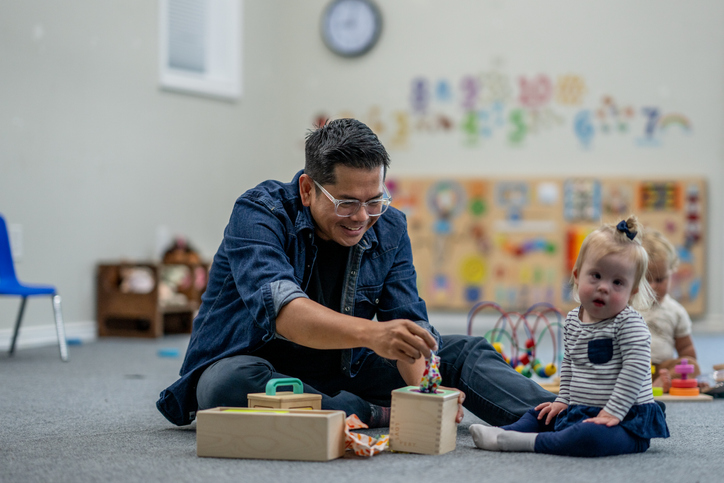Collaboration with Behavior Support Specialists
Learning Objectives
After this chapter, you should be able to:
- Develop communication strategies to establish positive and trusting relationships with families and support specialists.
- Implement appropriate assessment tools and procedures to identify developmental delays or underlying issues contributing to challenging behaviors.
- Effectively involve families and support specialists.

Consulting with Other Professionals and Making Referrals
Creating effective partnerships with teachers, families and other professionals allows the sharing of information about the child’s ongoing experiences and achievements and what works well for that child. When a child does not respond to daily behavior guidance strategies, it is essential that early childhood educators consult with parents or caregivers about developing specific behavior guidance strategies. There may be times when additional professional assistance and external support are needed to help a child. There may be underlying issues that are preventing the guidance strategies to be effective, such as cognitive delays, hearing loss, or sensory processing differences. The first step would be to assess the child to ensure developmental milestones are being met. If not, document any delays using the assessment tools provided by the school or child care center. When discussing concerns about a child not meeting developmental milestones with parents or caregivers, it’s crucial to approach the conversation with empathy, sensitivity, and a collaborative mindset. Research suggests that effective communication with parents plays a vital role in addressing developmental concerns and promoting positive outcomes for children (Gilliam, Maupin, Reyes, Accavitti, & Shic, 2016). As educators, it’s essential to establish a supportive and nonjudgmental atmosphere where parents feel comfortable sharing their observations and concerns about their child’s development. Open-ended questions and active listening can help to elicit parents’ perspectives and foster a sense of partnership in addressing the issue (Dockett & Perry, 2014). Keeping cultural responsive in mind, be mindful when meeting with families that do not speak English as their first language to offer an interpreter if necessary. There might be the potential for strong emotions to surface when caregivers are notified there could be developmental delays and/or their child is not responding to guidance in the classroom. This could impact their ability to process the information as quickly when they have to translate the information themselves.
During the conversation, it’s important to provide specific examples of observed behaviors or skills that may be indicative of developmental delays, while also acknowledging the variability in children’s growth and development. By emphasizing the importance of early intervention and the potential benefits of addressing developmental concerns proactively, educators can help parents understand the significance of seeking further assessment or support from appropriate professionals, such as pediatricians or early intervention specialists (Hanline, 2017). As the early childhood educator, be prepared to offer resources and guidance to parents on how to support their child’s development at home through everyday interactions and activities. Collaboratively developing an action plan with concrete strategies and goals can empower parents to play an active role in their child’s growth and progress (Henderson & Mapp, 2002). By fostering a culture of partnership and shared responsibility, educators and parents can work together to support the holistic development of preschoolers and ensure that every child receives the individualized care and attention they need to thrive.
The family should be referred for Child Find if there are documented developmental delays. Parental or caregiver consent is required where referral for intervention is requested by educators. When professionals from other support services become involved in assisting with a behavior guidance program for a child, it is important that this is done in collaboration with educators and parents. This gives everyone the opportunity for input and information about the strategies and expectations that are developed. It is also important that all adults (including volunteers) working with the child during the school day, even if only for a brief period each day, are aware that there is a specific behavior guidance program to be followed for that child. This is necessary so that all educators have a consistent approach to guiding children who are displaying challenging behavior.
Children with diagnosed behavioral difficulties may require individual management plans and these must be developed in consultation with the family, professionals and/or support agencies. Multi-Tiered System of Supports (MTSS), Pyramid Model, and Positive Behavioral Interventions and Supports (PBIS) are a few agencies that use positive guidance to redirect challenging behaviors. Provide ongoing support and resources to families to empower them to actively participate in their child’s development and behavioral management. Remind the family that redirecting challenging behaviors is not a one time situation and that it requires patience and consistency with everyone involved with the child.
